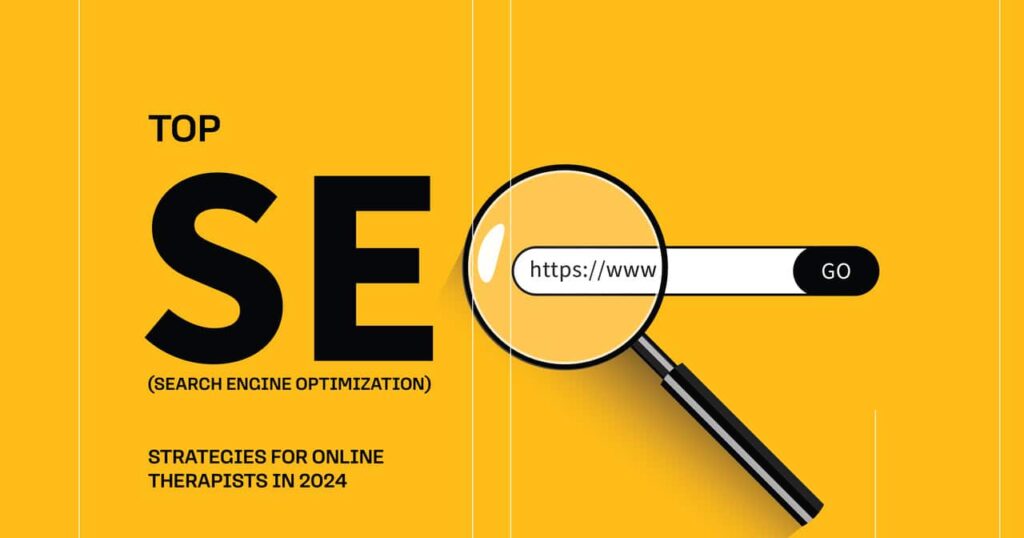In 2024, the online therapy industry continues to grow as more people seek mental health support through virtual platforms. For online therapists, having a solid digital presence is essential. Effective SEO (Search Engine Optimization) strategies can help you stand out in a competitive market, attract more potential clients, and build your therapy practice. This comprehensive guide will explore the top SEO strategies for online therapists in 2024, offering you the tools and techniques to succeed.
Why SEO is Crucial for Online Therapists
Search Engine Optimization (SEO) is the process of enhancing your website to improve its visibility in search engine results. For online therapists, SEO is crucial for several reasons:
- Visibility: A well-optimized website ranks higher in search engine results, making it easier for potential clients to find you.
- Credibility: High search engine rankings often correlate with trustworthiness. Clients are more likely to choose a mental health therapist whose website appears at the top of search results.
- Client Acquisition: Effective SEO attracts more visitors to your website, increasing the chances of converting them into clients.
In the ever-evolving field of online therapy, staying updated with the latest SEO strategies and techniques is essential for maintaining and growing your therapy practice.
Top SEO Strategies for Online Therapists
Keyword Research and Optimization
Identifying the Right Keywords
Effective SEO starts with understanding the terms your target audience uses to find therapy services online. Keyword research helps you discover these terms and integrate them into your content.
- Primary Keywords: Main terms related to online therapy, such as “online therapist,” “virtual counseling,” and “online therapy services.”
- Long-Tail Keywords: More specific phrases like “online therapy for anxiety,” “virtual couples counseling,” and “best online therapist for depression.”
Tools for Keyword Research:
- Google Keyword Planner
- Ahrefs
- SEMrush
On-Page Optimization Techniques
- Title Tags: Include primary keywords in your title tags. Example: “Top Online Therapist Services for Anxiety | [Your Practice Name]”
- Meta Descriptions: Write compelling meta descriptions with keywords. Example: “Find the best online therapists for anxiety at [Your Practice Name]. Professional virtual counseling services available. Contact us today!”
- Header Tags: Use H1, H2, and H3 tags to organize content and include relevant keywords. This helps search engines understand the structure and relevance of your content.
Content Creation and Blogging
Creating Valuable Content
High-quality content is vital to effective SEO. Create content that addresses the needs and concerns of your target audience.
Blog Topics:
- “How Online Therapy Can Help with Anxiety and Depression”
- “The Benefits of Virtual Counseling for Busy Professionals”
- “What to Expect from Your First Online Therapy Session”
Content Tips:
- Informative Articles: Provide valuable content and answer common questions related to mental health issues.
- Regular Updates: Keep your content fresh and relevant with regular updates.
- Engaging Formats: Use various formats like text, images, and infographics to enhance engagement.
Blogging Best Practices:
- Publish Consistently: Maintain a regular posting schedule to keep your audience engaged and improve search rankings.
- Use Keywords Naturally: Integrate keywords without keyword stuffing.
- Optimize for Readability: Use short paragraphs, bullet points, and clear headings to make your content more accessible.
On-Page SEO Best Practices
Optimizing Your Website
On-page SEO focuses on improving elements on your website to boost rankings.
- Page Speed: Ensure your website loads quickly. Use tools like Google PageSpeed Insights for analysis to improve page speed and reduce bounce rate.
- Mobile-Friendliness: Make sure your site is responsive and performs well on mobile devices.
- URL Structure: Keep URLs clean and descriptive. Example: www.yourwebsite.com/online-therapy-for-anxiety
Internal Linking
- Link to Relevant Pages: Improve navigation and distribute page authority. Example: Link from your “Anxiety Therapy” page to a blog post about “Managing Anxiety.”
Technical SEO Enhancements
Ensuring Technical Excellence
Technical SEO involves optimizing the technical aspects of your website to improve search engine rankings.
- XML Sitemap: Ensure your XML sitemap is updated and submitted to search engines to facilitate better indexing.
- Robots.txt File: Check your robots.txt file to ensure it’s not blocking essential pages from being crawled.
- Structured Data: Use schema markup to help search engines understand your content better and enhance your visibility in search results.
Common Technical Issues to Address:
- Broken Links: Fix any broken links on your site to improve user experience and SEO performance.
- Duplicate Content: Avoid and resolve duplicate content issues to prevent penalties from search engines.
Local SEO for Online Therapists
Optimizing for Local Searches
Even if you provide online services, local SEO can help you reach clients in your geographic area.
- Google My Business: Optimize your Google Business Profile for local searches. Ensure your information is complete and accurate.
- Local Keywords: Use location-specific keywords like “online therapy services in [Your City]” to target local clients.
- Local Listings: Ensure consistency across local directories like Yelp, Healthgrades, and Yellow Pages.
Encouraging Reviews
- Request Reviews: Ask satisfied clients to leave positive reviews on Google and other review platforms.
- Respond to Reviews: Engage with clients by responding to their reviews to build trust and credibility.
Building High-Quality Backlinks
Acquiring Valuable Backlinks
Backlinks from reputable websites enhance your site’s authority and improve search rankings.
- Guest Posting: Write guest blog posts for reputable mental health websites to gain high-quality backlinks.
- Partnerships: Collaborate with other therapists or organizations for link-building opportunities.
- Directories: Submit your site to mental health and therapy directories to improve domain authority.
Leveraging Social Media for SEO
Using Social Media to Boost SEO
Social media can drive traffic to your website and improve your SEO.
- Platforms: Focus on platforms like Facebook, Instagram, LinkedIn, and Twitter to reach a broader audience.
- Content Sharing: Share blog posts, articles, and updates about your practice to engage with your target audience.
- Engagement: Interact with your audience through comments, messages, and posts to foster a sense of community.
Advanced SEO Techniques
Voice Search Optimization
- Optimize for Natural Language: Voice searches are often phrased as questions. Use natural language in your content to address these queries effectively. Example: “What are the benefits of online therapy?”
User Experience (UX) and SEO
- Improve UX: A positive user experience enhances engagement and satisfaction. Ensure your website offers a positive user experience by focusing on ease of navigation and clear calls to action.
Tips:
- Ensure easy navigation and clear calls to action.
- Optimize website design for a clean, professional appearance.
Schema Markup for Therapists
- Implement Schema Markup: Use Local Business Schema to help search engines understand your business details better. Example: Add schema markup for your practice’s services, reviews, and contact information.
Monitoring and Measuring SEO Success
Using Analytics and SEO Tools
Regularly track and analyze your SEO efforts to measure success and make improvements.
- Google Analytics: Monitor traffic, bounce rate, and conversion rates to gauge the effectiveness of your SEO strategy.
- SEO Tools: Use Ahrefs, SEMrush, and Moz to track rankings and backlinks for ongoing optimization.
Key Metrics to Track:
- Organic Traffic: Measure the number of visitors coming from search engines.
- Conversion Rate: Track the percentage of visitors taking desired actions to assess SEO performance.
- Keyword Rankings: Monitor your rankings for target keywords to adjust your keyword strategy.
Conclusion
Implementing effective SEO strategies is crucial for online therapists looking to enhance their online visibility and attract more clients in 2024. Focusing on keyword research, content creation, on-page and off-page SEO, technical enhancements, and local SEO can improve your website’s visibility in search results and credibility.
Stay updated with the latest SEO trends, regularly review your strategies, and adapt to changes in the digital marketing industry to achieve long-term success.
FAQs
What are the best SEO strategies for online therapists?
The best SEO strategies include keyword research, high-quality content creation, on-page and off-page SEO, technical SEO, and local SEO.
How often should I update my blog for SEO?
Regular updates are essential. To keep your website fresh and relevant, aim to publish new blog posts at least once a month.
What tools are best for SEO keyword research?
Google Keyword Planner, Ahrefs, and SEMrush are excellent tools for discovering and analyzing SEO keywords.
How can I improve my local SEO for online therapy services?
Optimize your Google Business Profile, use local keywords, and ensure consistency across local directories.
What is schema markup, and why is it important?
Schema markup helps search engines understand your content better, which can improve your website’s search rankings and visibility.
By applying these strategies, you’ll be well on your way to establishing a robust online presence for your therapy practice in 2024.







